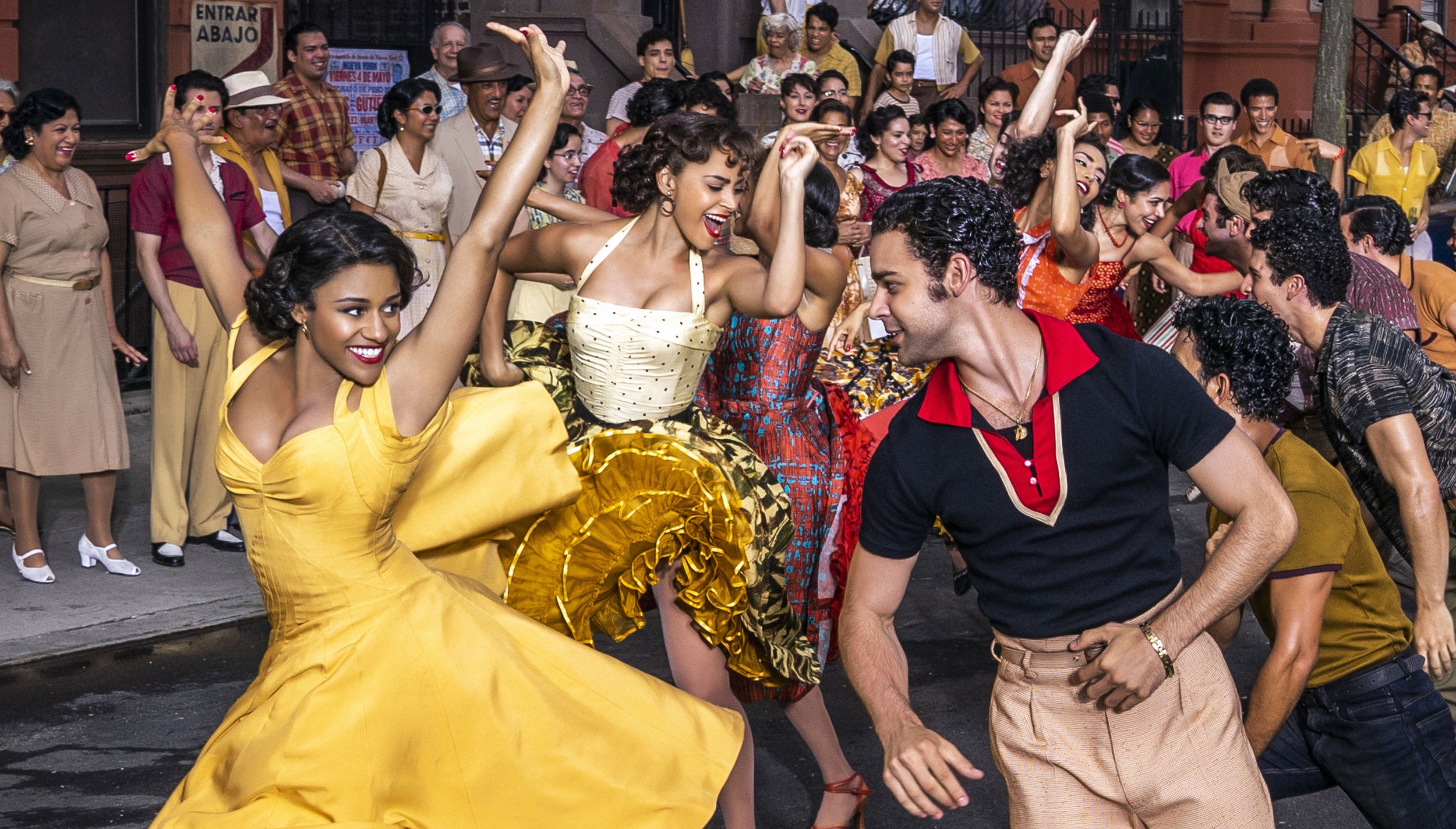West Side Story: Spielberg's First Musical Has Moves, Energy and Heightened Storytelling
By Jim Slotek
Rating: A-minus
When people say Steven Spielberg has “remade” West Side Story, it suggests the 1961 movie with Natalie Wood was somehow “original,” instead of being the movie adaptation of a 1957 Broadway hit that itself was itself taken from Romeo & Juliet.
At this point, the love story of Maria and Tony amid the late ‘50s turf wars between white and Puerto Rican gangs in New York, belongs to pop culture at large. (My first introduction to its songs came when I was 13 and heard Alice Cooper do a practically punk version of the “Jets Theme” on the album School’s Out.)
They like it here in A-mer-i-ca! Ariana DeBose and David Alvarez in West Side Story
Spielberg has shot his own vibrant and energetic movie directly from the play, with the songs in their original order. It differs from Robert Wise’s on several counts, not least being the casting of actual Hispanics as Puerto Ricans, Spanish being spoken profusely, and a little urban history that Spielberg hammers home, courtesy of Lieutenant Schrank (Corey Stoll).
Read our interview with West Side Story star David Alvarez
The movie opens with a “rumble,” after the Jets desecrate a mural of the Puerto Rican flag. Their melee with the Sharks is broken up by Officer Krupke (Brian d'Arcy James), which prompts a lecture from the Lieutenant about all the demolition going on.
He explains it will be followed by fancy towers that won’t welcome Puerto Ricans or “can’t-make-it Caucasians.”
This is some pretty on-the-nose prognostication. But it puts the entire story of Maria (Rachel Zegler) and Tony (Ansel Elgort), and the tragic ramifications of their love affair, up against the backdrop of New York’s brutalizing urban renewal of the time – “slum clearance” as it was called, though it was really “community clearance.” Not only are the lovers doomed, their entire world is as well.
PROUDLY SUPPORTS ORIGINAL-CIN
So, a fine dust covers much of the urban landscape in Spielberg’s West Side Story, as some pretty familiar songs – even to non-musical fans – play out amid swirls of color and choreography (Justin Peck here stepping into the shoes of original choreographer Jerome Robbins).
West Side Story lyricist Stephen Sondheim, who died at age 91 weeks before this film’s release, was not a fan of the ’61 film (or movie-musicals in general), and singled out the rendition of Tonight between Maria and Tony on the fire escape as being particularly static. Spielberg still has Tonight sung on the fire escape, but playfully uses angles and aspect to give the impression of the steel grill floor as a cage, separating them. The camera in this movie truly moves.
Nostalgia and old Hollywood iconography makes some of this daunting for the new cast. People will look at Zegler and say she’s no Natalie Wood, but why should she be? And Ariana DeBose as Anita is following in the footsteps of the great Rita Moreno (who is here in scene-stealing moments as Valentina, the widow of “Doc,” the friendly pharmacist in the ’61 film). And yet the young cast makes up in energy what they don’t yet have in career history.
Other standouts include David Alvarez as the amateur boxer Bernardo, Maria’s buff brother who has ill intent for the gringo wooing his sister, Josh Andres Rivera as the hapless, lovelorn Chino and Mike Faist as Riff, Tony’s best friend and proud co-founder of The Jets, whom he considers the family he never had.
Taken as a narrative, West Side Story has always had its flaws – particularly the speed with which Maria and Tony fall in love (basically, a glance over the dance floor), and how quickly she puts a profound family tragedy behind her in the last act.
But it says everything about Spielberg’s earned reputation as a master storyteller that these seem like mere quibbles against a story that literally leaps out at you. This West Side Story retains its ‘50s feel, while polishing this venerable gem of a musical to a greater gleam.
West Side Story. Directed by Steven Spielberg. Screenplay by Tony Kushner. Starring Rachel Zegler, Ansel Elgort and Ariana DeBose. Opens in theatres, Friday, Dec. 10.



